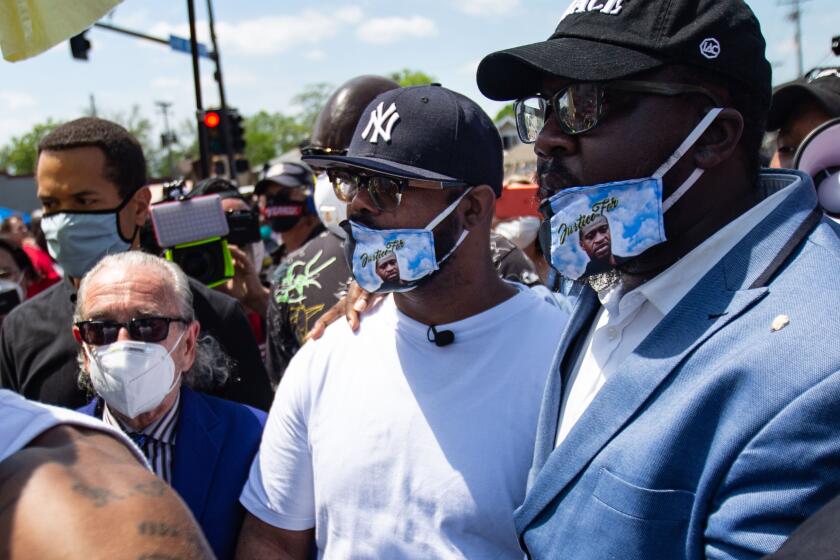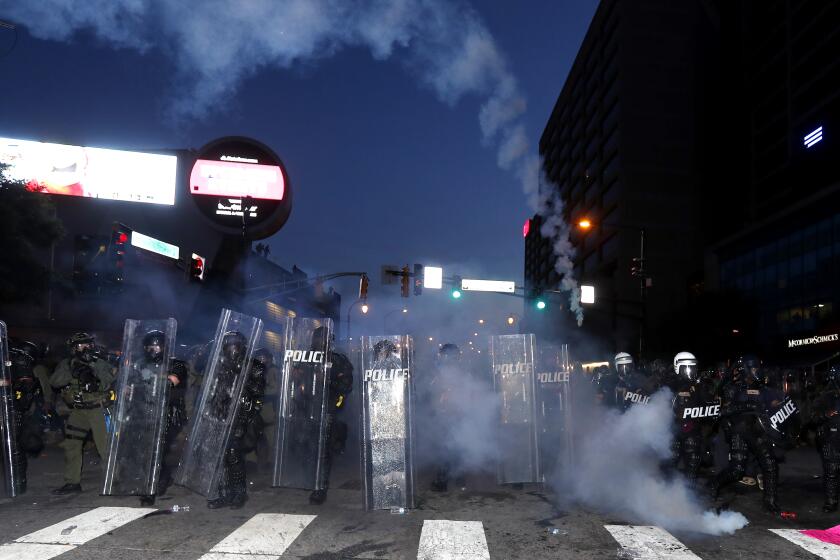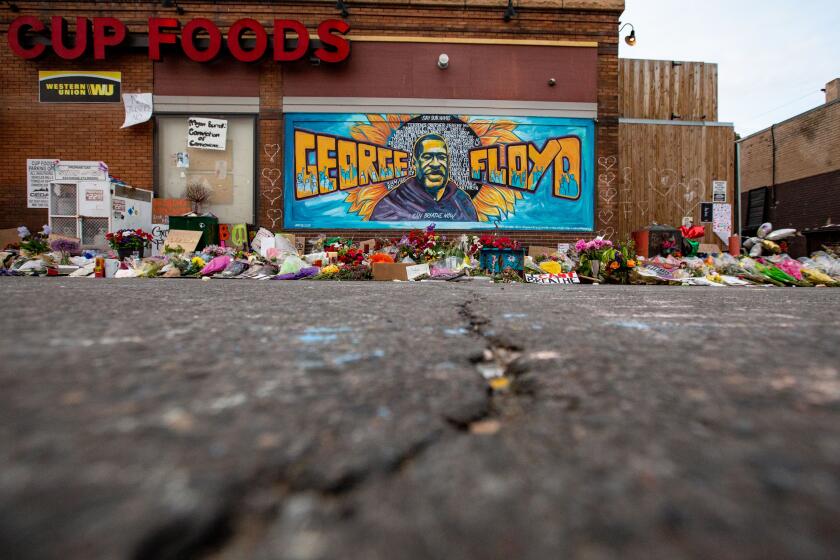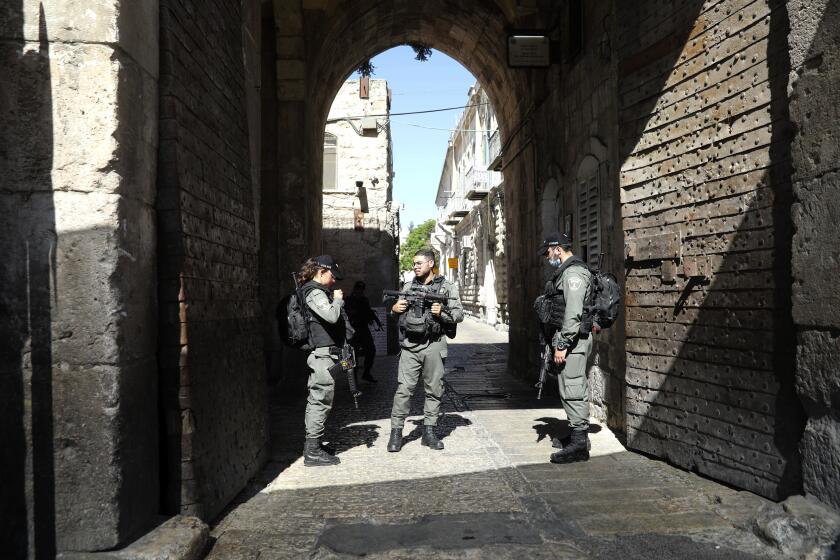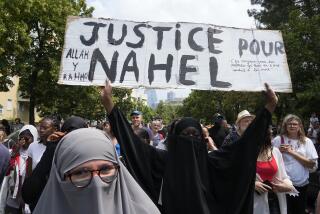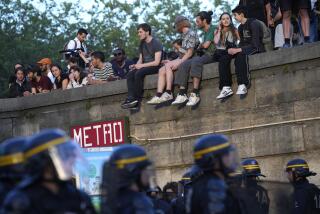George Floyd’s death becomes a rallying cry for activists worldwide
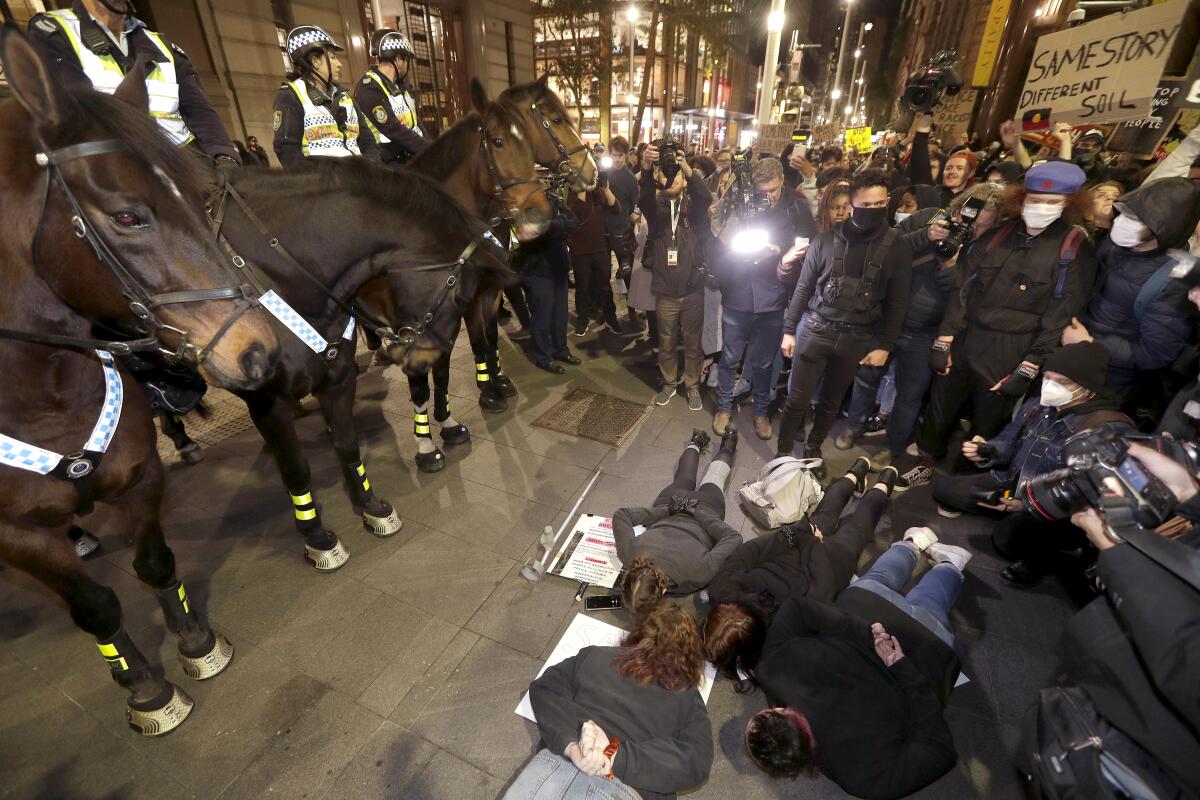
- Share via
SINGAPORE — The video is stomach-churning: a half-dozen uniformed officers holding a black man face down for several minutes as he gulps for air and screams, again and again, “I can’t breathe.” He falls unconscious and is pronounced dead a short time later.
The man in the clip is not George Floyd, who gasped those words as a white Minneapolis police officer knelt on his neck in a fatal arrest last week, but an Aboriginal Australian inmate, David Dungay, who died in a similar incident at a Sydney prison in December 2015.
As Floyd’s death ignites fiery protests in U.S. cities, it has also refocused attention on cases like Dungay’s — and become a rallying cry around the world for activists battling racism, police brutality and inequalities in criminal justice in their own countries.
Rallies this week in solidarity with American protesters and in pursuit of justice at home have sprung up in such countries as France, Turkey and New Zealand. In multiethnic, liberal democracies that share many of the same ideals and flaws as the U.S., the demonstrations have served as a reminder that oppression looks much the same no matter where you are.
“We don’t need to look to America to see the consequences of systematic discrimination. It’s right here at home,” said Nerita Waight, co-chair of a legal aid group for Aboriginal Australians. “What the U.S. protests do help with is to show that this is not just a problem in one country — it reaches across oceans and continents.”
In Australia, roughly 800,000 Aboriginal people — descendants of those who inhabited the continent before European colonizers arrived in the 18th century — liken their socioeconomic status to that of blacks in America. In some ways it is even worse: Though they represent only 3% of the population, they account for nearly 30% of the adults in prison.
George Floyd’s brother tells the nation to stop rioting: ‘That’s not going to bring my brother back’
George Floyd’s younger brother, Terrence Floyd, traveled from New York City to Minneapolis to visit a memorial at the site where Floyd was fatally restrained by police
More than 430 Aboriginal Australians have died in official custody since 1991. No officers have been convicted in the deaths.
At a rally this week that drew hundreds in Sydney, where social distancing measures because of COVID-19 have recently been eased, demonstrators chanted, “Black lives matter,” and “Justice today, for David Dungay.” More protests are planned for several cities across the country on Saturday.
Dungay, a 26-year-old diabetic, was eating a packet of cookies against orders when five prison guards dragged him from his cell, handcuffed him and forced him to lie face down while a nurse injected him with a powerful sedative. As he pleaded for breath, one officer responded: “If you can talk, you can breathe.”
He died three weeks before he was due for parole.
Dungay’s family demanded the officers be held accountable, but last year, an official inquiry blamed their conduct on “systemic deficiencies in training” and declined to discipline them.
Keiran Stewart-Assheton, a 28-year-old Aboriginal activist who helped organize Tuesday’s demonstration in Sydney, Australia’s largest city, said members of the community have regularly spoken out against custodial deaths and police brutality. But many of the deaths quickly fade from public consciousness, in part because they occur far from major cities, he said.
Over the weekend, he saw Australians posting videos of the U.S. protests with hashtags such as “black lives matter” — seemingly oblivious to race issues at home.
“It’s a bit disheartening that it’s taken something happening overseas to get people to start looking at their own community,” he said.
A look at how police nationwide have responded to protesters.
Protests have also gripped Paris and London — both capitals where police have been accused of excessive force in recent deaths of young black men.
Thousands rallied Wednesday in central London’s Hyde Park, chanting, “No justice, no peace.” Many of the protesters wore masks to guard against the coronavirus.
In Paris, where authorities had banned protests because of the risk of COVID-19, an estimated 20,000 people turned out Tuesday for a demonstration that began peacefully but ended with objects being hurled at police, who responded by firing tear gas.
The protest was called by Assa Traore, whose brother Adama, a 24-year-old black Frenchman with roots in Mali, died at a police station in 2016 after officers pinned him down with their body weight during an arrest. Last week, a medical examiner cleared the officers of wrongdoing and said Traore’s death was linked to preexisting health conditions — a finding his family has disputed.
An autopsy commissioned for George Floyd’s family found that he died of asphyxiation, the family’s attorneys said Monday.
His case has become a tinderbox in France, where immigrants from former African colonies and their descendants have long been marginalized, living in rough neighborhoods on the edges of Paris and other major cities, viewed by many whites as criminals and a threat to French identity.
Blacks in France say they are disproportionately targeted by police. Just last week, in an outer district of Paris, a bystander recorded a police officer who had his knee on a black man during an arrest.
“The officer had certainly seen the viral video that [showed the killing] of George Floyd, but nothing stops them,” one man tweeted.
Didier Lallement, the Paris police chief, insisted this week that his force “is not violent, nor racist,” and said the accusations caused “pain” to his officers.
Addressing the crowd at Tuesday’s protest, Assa Traore said events in the U.S. were “an echo of what is happening in France.”
“Today we are not just talking about the fight of the Traore family,” she said. “It is the fight for everyone. When we fight for George Floyd, we fight for Adama Traore.”
In Israel, protests flared in Tel Aviv and Jerusalem after police shot and killed Iyad Halak, a 32-year-old autistic Palestinian man in East Jerusalem who was suspected to be a terrorist because he “was wearing gloves,” according to the official investigation.
The shooting death of an unarmed autistic Palestinian man by Israeli forces is drawing angry condemnations from Arab residents and leaders and is further raising tensions in the region as Israel prepares to annex parts of the occupied West Bank.
The death last weekend prompted an apology from Israeli Defense Minister Benny Gantz, but epitomized what Palestinian and liberal Israeli activists have long described as ruthless behavior by Israeli security forces toward Palestinians. Some compared the shooting to Floyd’s death.
“In the U.S., you have a struggle fighting structures of supremacy, domination and oppression that clearly marginalize certain communities but also disproportionately lead to their deaths,” said Salem Barahmeh, director of the Palestine Institute for Public Diplomacy.
“It’s discrimination and a form of supremacy predicated on your race and ethnicity rather than anything else. Those structures of supremacy and oppression are similar to the ones we’re dealing with here.”
In many of the countries, activists pointed to another parallel with the U.S.: a lack of political will to confront the problem.
Breaking News
Get breaking news, investigations, analysis and more signature journalism from the Los Angeles Times in your inbox.
You may occasionally receive promotional content from the Los Angeles Times.
Successive governments in Australia have failed to implement most of the recommendations of a landmark 1991 report aimed at reducing the deaths of Aboriginal people in custody, including ending punitive bail laws, rolling back mandatory sentencing and decriminalizing minor offenses such as public drunkenness.
Prime Minister Scott Morrison has sought to distance Australia from the sort of police brutality seen in the U.S., calling the video of Floyd’s death “upsetting and terrible.”
“I just think to myself how wonderful a country is Australia,” Morrison said.
Times staff writer Nabih Bulos in Beirut contributed to this report.
More to Read
Sign up for Essential California
The most important California stories and recommendations in your inbox every morning.
You may occasionally receive promotional content from the Los Angeles Times.
